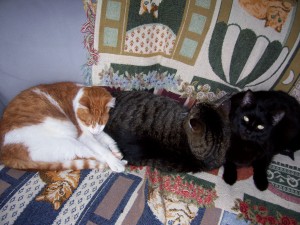Nina’s and My Excellent Musical Experience
Nina(rhymes with Dinah) and I went to a piano concert on Saturday evening.
“I am so looking forward to the couch,” I said as we set off.
“So am I.” Nina said.
We headed downtown to Sherman and Clay to hear Fred Kronacher. It’s something we do three times a year. The first two concerts are always at Green Lake United Methodist Church where the platform is staged to resemble a drawing room and the lamps and flowers obscure the keyboard. We always complain about it. We sometimes ask a staff person to do something about it. There was one memorable occasion when we re-arranged the stage ourselves.
The last program of the series is always downtown at the Sherman and Clay piano store where they re-arrange the showroom to accommodate an audience. Rows of uncomfortable folding chairs dislocate a couch and two armchairs to one side of the room. Nina and I always sit–and sometimes lie–on these renegade pieces of furniture. They face away from the performer but we don’t care. We sit –or lie—on them because we are middle-aged women and we can.
I had had a long, busy day on Saturday and I was looking forward to claiming the couch for the duration of the recital. This took precedent in my mind over the actual content of the concert which in any case is always brilliant.
“What’s he playing this time? I can’t remember.” Nina said
“I don’t know either. I just want to lie on the couch.”
At the door we rummaged for our tickets.
“Oh, it’s Schubert and Schumann. Oh good, I like them,” I said.
“We couldn’t remember what the topic was,” Nina explained to the ticket takers who we privately call Fred’s Groupies.
But when we got into the showroom, the couch and armchairs were gone.
“You moved the couch!” I said to the first staff person I saw. I didn’t know if he was Mr. Sherman or Mr Clay. (He was Oscar Spidahl.) I might have sounded a teensy bit accusing.
“You liked the couch?” he inquired
“It’s the only reason we came.”
He looked at me like he was appraising me somehow.
“I like demanding and entitled people,” he said. “I think I can help you.”
Nina and I looked at each other. Demanding and entitled. Huh.
Oscar pulled two armchairs –not as plush as the ones to which we were accustomed, but more comfortable than the folding chairs—out of an office. He set them up for us well away from, as he put it, the riffraff.
“Demanding and entitled,” I said. “I like it.”
Fred is an exquisite pianist. He also has a gift for transmitting his enthusiasm for classical music. He tells the audience a little about the composer, and demystifies some of what we will hear in the work he is about to perform. He plays snippets from the pieces and suggests what to listen for.
He has two other penchants which I, as a teacher and performer, applaud. He understands attention spans. His lecture/concerts last one hour and thirty minutes. The end.
Secondly, he silently directs audience etiquette. He sits at the piano and looks at the offender if there is any talking or rattling. He is much nicer than the sister at Late Nite Catechism but he gets the same message across: we are not going on until it is quiet. Once the concert begins people do not talk and they do not rattle candy wrappers and programs. Even so I don’t feel the terror that I do at a Wagner opera or a Gilbert and Sullivan show, terror that I might breathe too loudly and cause someone to miss an iteration of a motif or a line in a patter song. I especially don’t feel the terror when I’m lying on a couch.
Alas, there is nothing Fred can do about helicopter parents such as the one who sat in front of us. The father and the two boys sat still and attentive but I swear the mother did not come to listen to piano music. She came to watch her youngest child attend a piano concert.
She turned to look at him.
She fussed at him, put her arm around him, and smiled at him.
She looked at the piano and nodded two or three times to the music.
She sat still for five seconds.
Repeat.
Though I was in danger of falling off the chair which I wouldn’t have been if I’d been on a couch, I closed my eyes. It was a good call anyway. The work was Schumann’s “Carnaval,” a musical description of a series of characters entering the ballroom for a masked ball. Fred had given a wee introduction to the characters and the musical themes and then suggested that we not follow along as he played the 21 short pieces because, as he said, “This is music.”
You, too, can have an excellent musical experience: http://www.musicalexperiences.org/ but I get first dibs on any couches.
 RSS Feed
RSS Feed





